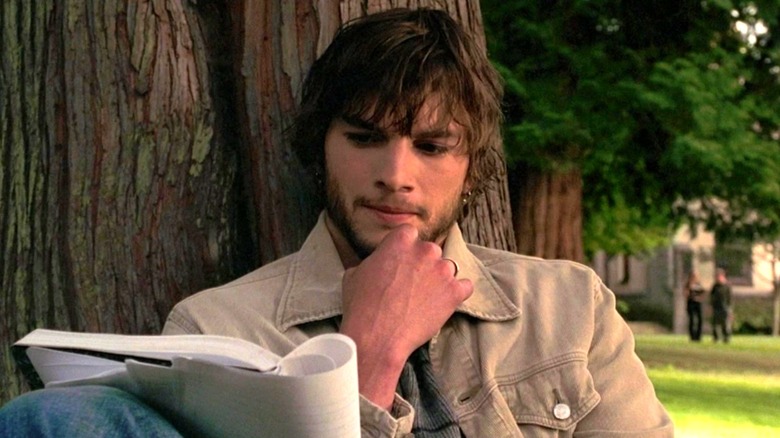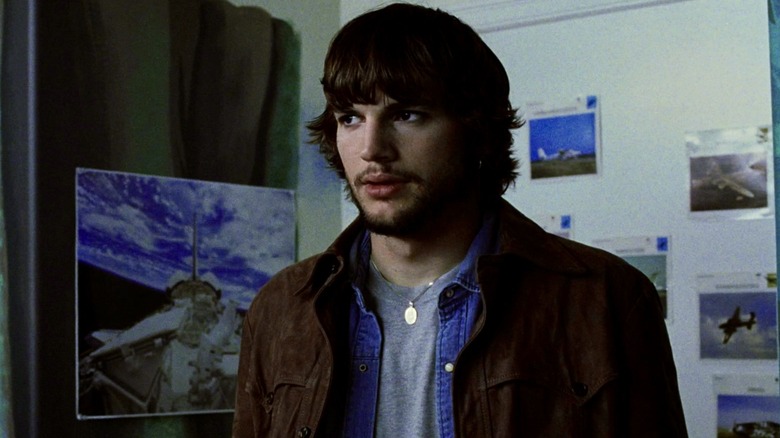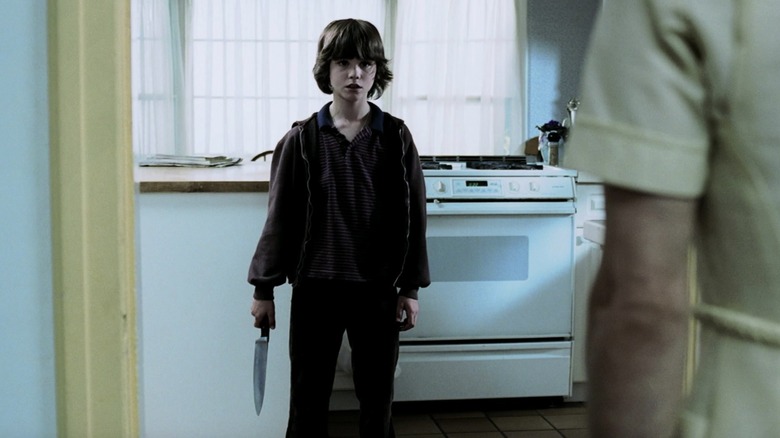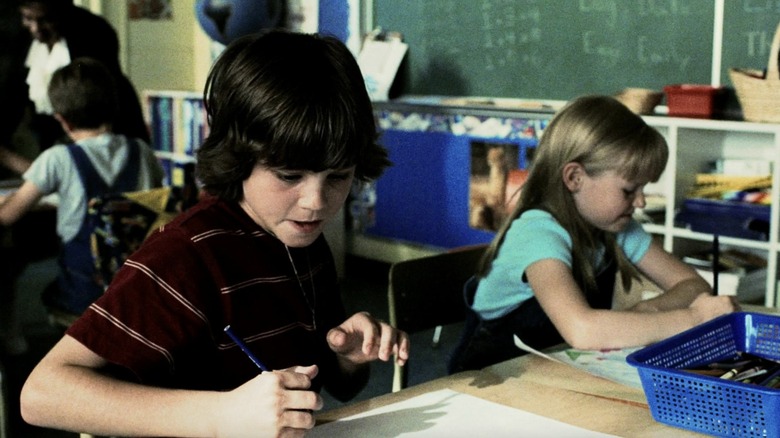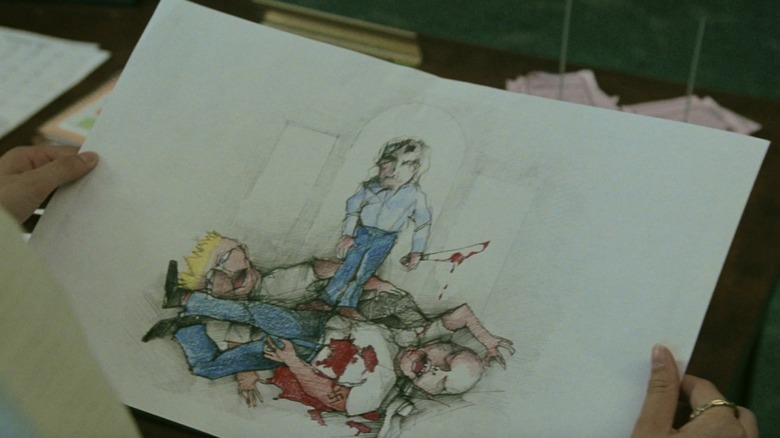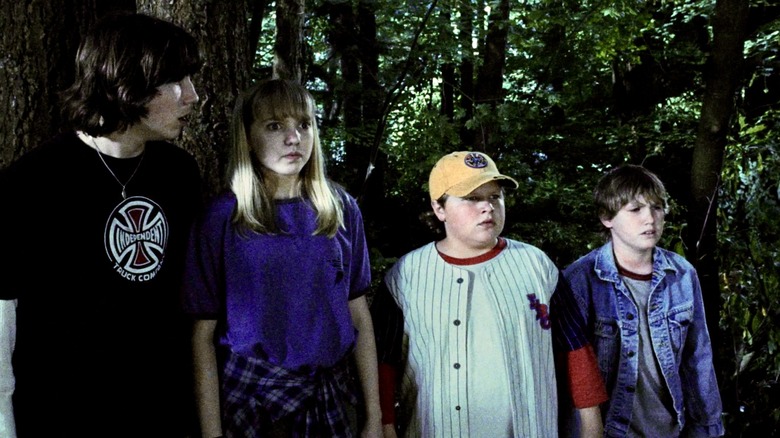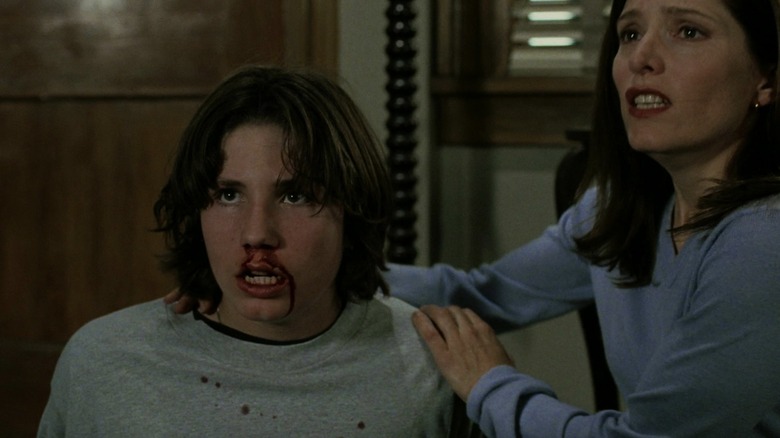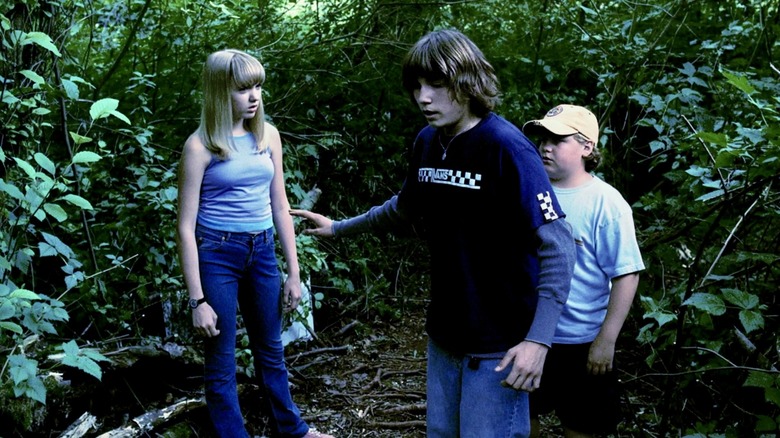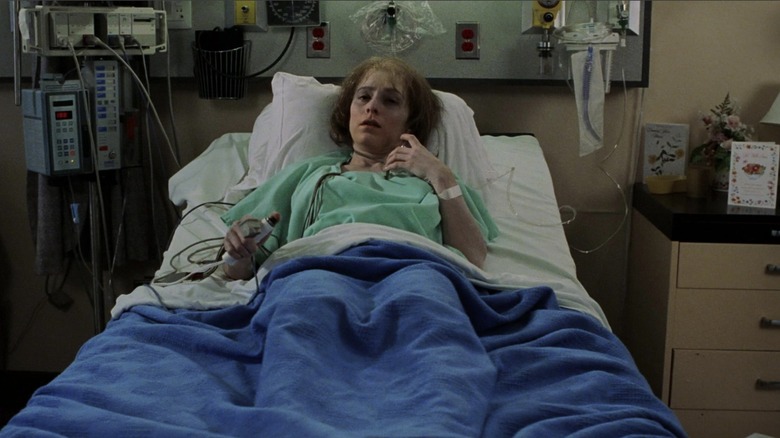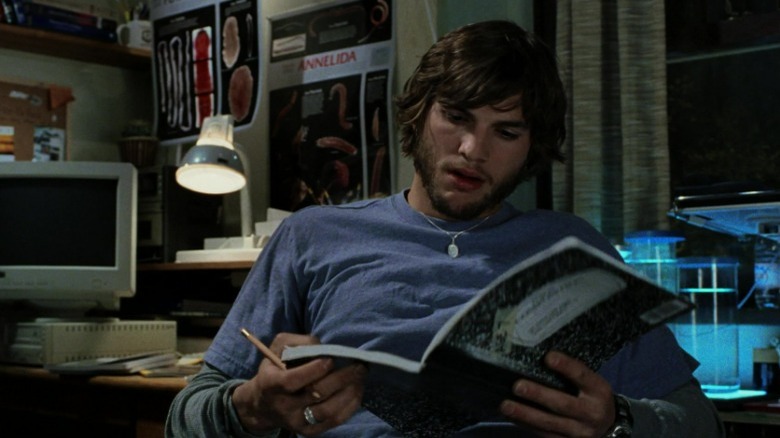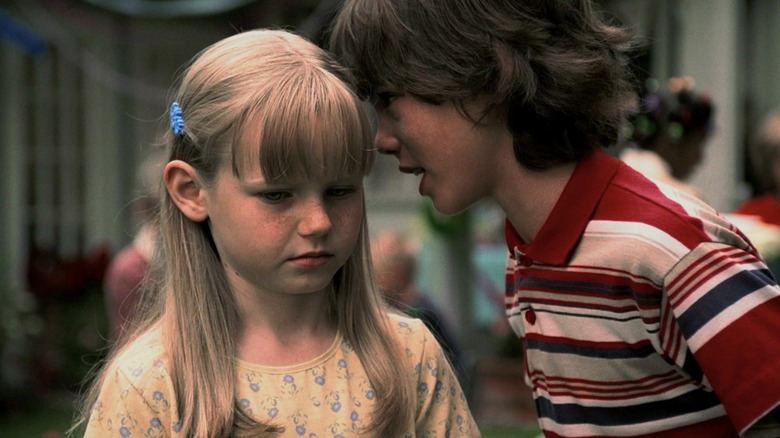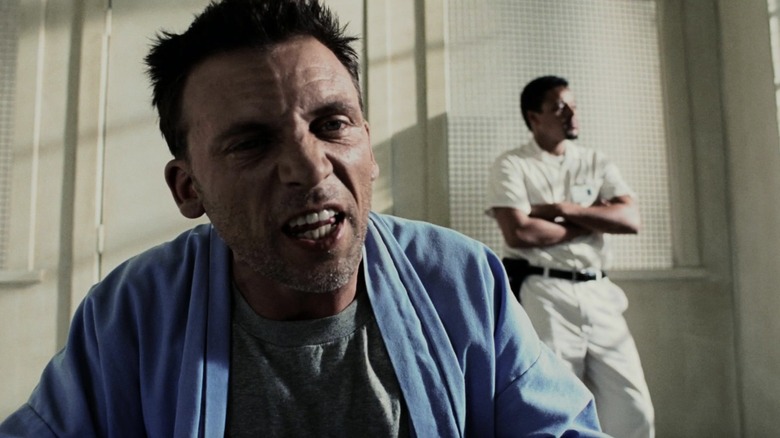Things In The Butterfly Effect You Only Notice After Watching It More Than Once
"The Butterfly Effect" follows the life of Evan Treborn, played by Logan Lerman at seven years old and John Patrick Amedori at 13. Memory gaps plague Evan during his childhood, many of which are linked with traumatic events he experienced with his friends Lenny, Kayleigh, and Tommy. Evan's mother, Andrea (Melora Walters), is troubled by these blackouts because Evan's father, Jason (Callum Keith Rennie), suffered from similar blackouts before being committed to a mental institution.
As a college student, Evan (Ashton Kutcher) studies psychology to understand why he has memory gaps but hopes to retrieve his lost memories. Evan has a strange experience while reading one of his journals that sees him reliving a terrible experience that resulted in the death of his dog Crocket and becomes convinced he can travel through time. After visiting Kayleigh (Amy Smart) to ask about another blackout, she commits suicide, and Evan travels back in time, hoping to save her, but soon discovers that significant changes in the past make for unpredictable results.
Ashton Kutcher's transformation from goofy Michael Kelso of "That '70s Show" into Evan may not have been a hit with critics, but "The Butterfly Effect" was a commercial success, raking in $95 million worldwide. Like most time travel movies, this sci-fi thriller has its fair share of plot holes and paradoxes, which are only compounded by Evan's ability to remember all his timelines. Keep reading to explore some things you only notice after watching "The Butterfly Effect" more than once.
Evans wears a St. Christopher necklace
You probably noticed that Evan wears a necklace in "The Butterfly Effect," but you may have not thought about the significance of the specific necklace he wears. As fans pointed out on Twitter, Evan wears a St. Christopher pendant throughout every phase of his life during the film. This is a noteworthy motif that foreshadows Evan's supernatural gift to travel through time in his mind because St. Christopher is known as the patron saint of travelers. Evan becomes a time traveler in college after discovering his journals can transport him back in time to experience events from his childhood and even give him a chance to change these events in hopes of making a better life for his friends Tommy, Lenny, and Kayleigh.
This detail begs a few questions. The most important of those questions, however, is did Evan inherit his pendant from his father, just like he inherited his powers? Although it is only vaguely hinted at in the theatrical release of the film, which is the version of the film we are exploring today, the director's cut suggests this power to travel through time was inherited from his father, Jason, who inherited the curse from his own father. This ability ultimately has tragic consequences, as it leads to both men being institutionalized and dying in the asylums they were committed to. Did Jason insist his son wear a St. Christopher pendant as a protective amulet to safeguard Evan from the dangers of time travel?
Evan's time travel is the source of his memory lapses
Although it should be clear to the audience that Evan's memory lapses, or blackouts, are caused by his time travel, the movie doesn't explicitly state this. If you didn't piece it together the first time you watched "The Butterfly Effect," you definitely understood this during your second viewing. It appears that Evan experienced these blackouts as a child because his adult consciousness took over his body while visiting from the future.
This unique mechanism suggests the type of time travel Evan and his father experience would be limited to their own lifespans, something similar to what Dr. Samuel Beckett (Scott Bakula) experiences in "Quantum Leap." Evan and Jason do not physically transport themselves through time, they mentally transport their adult consciousness to their own body in the past. They can effect change in the future through alternative choices during their younger years, but every trip to the past creates a new memory lapse.
Although the film's action suggests this hypothesis, it is never clear if Evan understands that his ability to time travel is the source of his blackouts. The film is told through Evan's point of view, so we see Evan's life through his linear experience of growing up before discovering he can travel back to his childhood. This type of time travel also introduces an interesting paradox in that Evan has to travel back in time to cause the blackouts he experienced as a child, which suggests that time in the film's world is circular rather than linear.
Evan's violent drawing is the ultimate time paradox in the film
The technique and skill of the drawing Evan's teacher shows to his mother at the beginning of "The Butterfly Effect" is clearly the artwork of an adult. In your first viewing, this drawing is the first sign something hinky is going on. Upon a second screening, this drawing confirms our suspicion Evan's blackouts as a child were caused by his adult consciousness hijacking his mind as a child.
Evan only travels back to his childhood classroom to convince his cellmate Carlos (Kevin Durand) to help him retrieve his journals from the neo-Nazis who stole them. Evan chooses this location because the page he ripped from his journal when it was stolen has an entry about the drawing. This scene is one of the biggest abuses of time travel logic in the film because the marks Evan creates on his hands while time traveling should have always been there from Carlos' perspective, while the scars would have appeared suddenly to Evan.
Evan remembers his original timeline despite the alternate timelines he creates by changing the past. The crux of the entire time travel scenario in this film relies upon Evan going back in time to create that drawing, leading to his psychologist recommending Evan keep the journals he ultimately uses to travel back in time. This scene bothers some fans on Reddit, but isn't part of the fun of time travel movies arguing about the paradoxes of time travel?
The drawing is of the neo-Nazis Evan will kill when he returns to prison
You probably missed this the first time around, but the violent and disturbing drawing that led to Evan visiting a psychologist as a child and keeping a journal throughout his life is of the neo-Nazis Evan is harassed by while in prison for killing Tommy (William Lee Scott).
After making this drawing (to continue the time travel loop) and stabbing his hands on spikes in the classroom, Evan is transported back to prison with evidence of stigmata as "proof" for his religious cellmate, Carlos. When Mrs. Boswell (Lorena Gale) asks the children to draw what they want to be when they grow up, Evan draws himself as a killer. He does this because he is dealing with the trauma of killing Tommy and because he plans to kill the neo-Nazi when he returns to jail so he can retrieve his journals and travel back in time again, hoping to create an alternate timeline where he doesn't kill Tommy this time around.
There are only unpredictable consequences when Evan tries to alter other's lives
Some felt Evan stabbing his hands in his classroom should have created changes, so Evan wouldn't have returned to jail for killing Tommy, but this is evidence of a pattern we see repeatedly in "The Butterfly Effect." When Evan alters events that only involve himself, or his mother and father, there are no consequences and the future timeline he returns to is the same. When Evan revisits the mailbox bomb the first time, he burns himself with his cigarette but goes back to an unchanged reality.
When Evan travels back to meet his father and asks how time travel works, his father strangles him just like when he was a kid, and Evan returns to an unchanged reality where he is a college student. When Evan travels back to his kitchen as a child to find a knife to cut up the stick of dynamite while visiting Kayleigh and Tommy in their basement, he immediately jumps back to the reality where he is an amputee.
However, when Evan goes back to the past to alter events to help Kayleigh, Lenny, or Tommy, the consequences are devastating. In one alternate timeline, Lenny winds up in a mental institution, while Kayleigh is an addict and sex worker. In one timeline, Tommy, Lenny, and Kayleigh are happy and healthy, but Evan is an amputee and his mother is dying. Tommy dies in two timelines. In another, Kayleigh dies and Evan ends up in an institution.
Evan only gets nosebleeds when he revisits a past event more than once
Evan only gets nosebleeds when he revisits a blackout for the second time, and he only goes back to his previous blackouts more than once when he wants to change something. Evan only revisits three blackouts twice and gets a nosebleed on the second visit when he changes something. Telling George off in the basement and saving the woman and her baby from the mailbox bomb both result in a nosebleed and brain damage.
The single exception to this pattern in "The Butterfly Effect" is when a 13-year-old Evan tries to recover his memory with his psychologist while under hypnosis. Evan struggles to understand what is happening in his memory, suggesting it is disjointed. All he can remember is the mailbox, the bomb, and a car driving up before Evan gets his first nosebleed and Dr. Redfield (Nathaniel DeVeaux) pulls Evan out of his hypnotic state. Is this because his future self visited this memory twice and there are multiple versions of that incident in multiple realities?
One interesting but confusing element of time travel logic in this movie is that Evan can hold the memories of every alternate reality he creates when he changes something in his past. The damage to his brain is consistent with mapping 40 years' worth of memories in one year, as Evan explains to Andrea while consulting Dr. Redfield after a nosebleed upon returning from changing what happened the day Tommy killed Crocket.
Evan develops more control over his time travel gift
The first time Evan intentionally travels back in time to change something, he goes back to the day George Miller (Eric Stoltz) made an inappropriate movie of Evan and Kayleigh in the basement. Evan returns to the backyard before they go to the basement, exactly when Evan's blackout began in the original timeline. Evan tells George off, explaining if he goes down this road, taking advantage of Kayleigh's trust, she will become a broken shell and commit suicide. Kayleigh tells George to never touch her again and Evan returns to a timeline where things are very different.
The second time Evan revisits the junkyard, he arrives before his blackout begins in the original timeline, grabbing a metal shard and giving it to Lenny to cut open the sack, so he can save Crocket while Evan talks Tommy down. Arriving before his blackout began in the first timeline shows Evan has more control over time travel and suggests he isn't limited to visiting his blackouts. This intervention is more successful because Evan talks Tommy down and saves Crocket, but this still has disastrous consequences when Lenny kills Tommy with the shard, resulting in a new reality where Lenny is institutionalized and Kayleigh is an addict and sex worker.
If you or someone you know may be the victim of child abuse, please contact the Childhelp National Child Abuse Hotline at 1-800-4-A-Child (1-800-422-4453) or contact their live chat services.
If you or anyone you know is having suicidal thoughts, please call the National Suicide Prevention Lifeline at 1-800-273-TALK (8255).
Jason foreshadows Andrea's illness in a future timeline
When Evan time travels back to when he met his father for the first time in the psychiatric hospital, Evan asks Jason for help understanding how time travel works, hoping he can avoid the disastrous results his father has experienced. Jason tells Evan he can't play God and that you can never predict what will happen when you change something, saying, "just by being here, you may be killing your mother." Evan doesn't believe Jason, replying, "I'll send you a postcard when I've made everything perfect again," finally revealing why Jason attacked Evan when they met during the original timeline.
After Evan attempts to stop the mailbox bombing during his next time travel experiment, the reality Evan returns to is one in which he is an amputee because of the mailbox bomb and his mother, Andrea, is dying of lung cancer after becoming a chain smoker in the wake of Evan's life-altering accident. Jason's comment to Evan foreshadowed this alternate timeline, suggesting Jason had extensive experience with time travel before he was committed to the institution.
If you or someone you know is struggling with mental health, please contact the Crisis Text Line by texting HOME to 741741, call the National Alliance on Mental Illness helpline at 1-800-950-NAMI (6264), or visit the National Institute of Mental Health website.
There are multiple scenarios that repeat no matter what Evan changes
There are some constants throughout "The Butterfly Effect" until everything unravels and leads toward the climax of the film. These constants suggest Evan has a predictable arc to his life, regardless of minor changes, which is contrary to the chaos theory's butterfly effect, which hypothesizes that slight changes have a huge and unpredictable impact on the future. We have seen consistently that when Evan revisits the past and changes something concerning himself, the changes are negligible, and Evan's life largely remains the same.
Evan goes to the same college in all but one alternate timeline. If Lenny is mentally healthy, they are roommates; but if Lenny is unhealthy, Thumper (Ethan Suplee) is Evan's roommate. The one time Evan isn't living in the dorms with a roommate and studying psychology, he is in a fraternity while Kayleigh is in a sorority, and they are a couple. This alternate reality resulted from an enormous change in the past, one that specifically affected Kayleigh's life trajectory.
In the only timeline where Evan doesn't go to college, he was committed to a psychiatric hospital as a child after Kayleigh was killed in an explosion that was Evan's fault. It's obvious that despite his efforts, everything Evan tries to do to save Kayleigh only dooms her to a worse fate and that the more significant changes he attempts to make, the more disastrous the consequences are. By the climax of the film, Evan has concluded that his presence in Kayleigh and Tommy's life is detrimental.
Evan doesn't actually need a journal to time travel
Evan initially uses his journals to time travel, but when the journal is unavailable in the timeline where Evan has been committed to a psychiatric hospital, Evan must adjust his methods. A conversation between Evan and his psychiatrist Dr. Redfield suggests Evan's father, Jason, used photographs to travel back in time. This is further explored in the director's cut of "The Butterfly Effect" where we learn that Evan's grandfather was also a time traveler. Instead of relying on his journals, Evan uses a home video, successfully traveling back to the first time he met Kayleigh at a birthday party, hoping to prevent them from becoming friends.
During his experiences in alternate timelines, Evan learned Kayleigh lived with her father because she didn't want to move away from Evan because he was the first person she cared for. After Evan threatens Kayleigh's family and says he hates her, Evan returns to an alternate timeline where Lenny and Evan grew up not knowing Kayleigh and Tommy, who lived with their mother. Evan and Lenny are happy. Tommy and Kayleigh grew up loved and were not traumatized. Satisfied with this reality, Evan burns all his pictures, journals, and the home movie so he won't be tempted to return to the past ever again.
Evan's fate differed from Jason's because Evan learned from his mistakes
Evan's success in going back to the birthday party confirms Evan can travel to events other than his established blackouts, and he doesn't need journals to do it. It also suggests that if Evan continued traveling back to other events in his past, he would create more blackouts and brain damage from the changes he attempted to make during these visits.
The end of the film suggests Evan's fate differed from Jason's because Evan prevented him and Kayleigh from being friends and he stopped time traveling after that choice created a reality he could accept. Jason wound up in a psychiatric facility, suggesting he either kept traveling until he caused so much brain damage to himself that he was institutionalized — or he wound up in the institution because of something he tried to change.
The original ending of "The Butterfly Effect" was quite grim. Instead of going to the birthday party, Evan traveled back to the womb, intent on erasing his existence to protect everyone else. Although this ending was never filmed, the director's cut revealed Andrea had two pregnancies before Evan that didn't carry to term. This information raises some questions, but even the theatrical cut leaves us wondering. Did Evan actually travel back to the mailbox incident for the first time when he was a teenager while under hypnosis? If Evan can time travel in his mind unaided by memorabilia, why did he bother burning everything?
